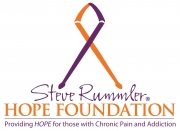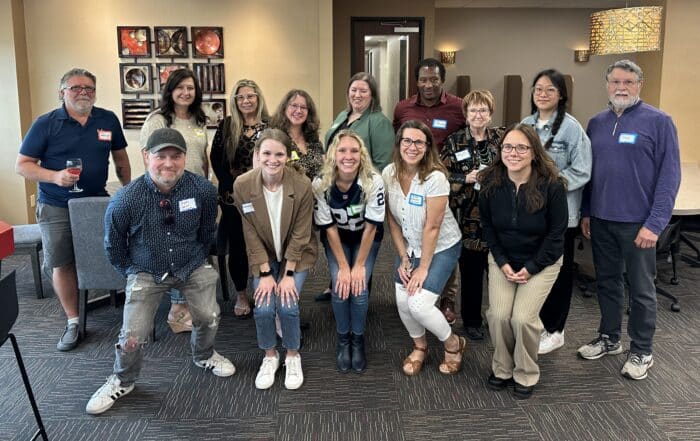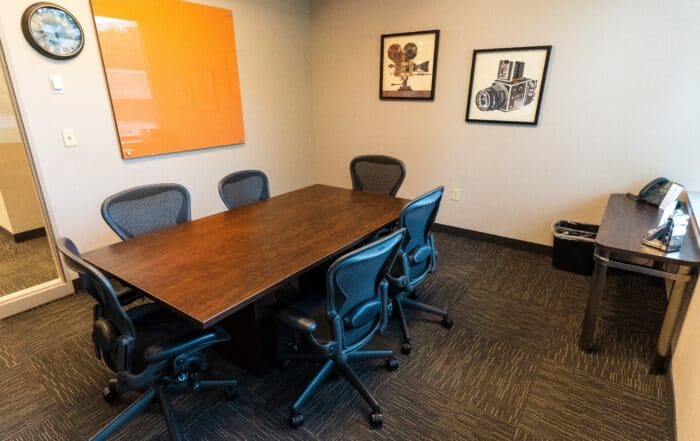April – Success
 The Steve Rummler Hope Foundation was founded in 2011 by Bill and Judy Rummler. Their son, Steve, died that year of an accidental opioid overdose after struggling with addiction brought on by efforts to manage his chronic pain. The foundation was established with the goal of helping others suffering from chronic pain and the disease of addiction. Read about their efforts below.
The Steve Rummler Hope Foundation was founded in 2011 by Bill and Judy Rummler. Their son, Steve, died that year of an accidental opioid overdose after struggling with addiction brought on by efforts to manage his chronic pain. The foundation was established with the goal of helping others suffering from chronic pain and the disease of addiction. Read about their efforts below.
Every business has a story, tell us yours.
In 1996, Steve Rummler suffered a life-changing back injury and began a journey that would end tragically in 2011. He sought help from many medical and mental health professionals; however, he never received a treatable diagnosis for his back injury. Steve became depressed and was treated with anti-depressants and anti-anxiety medications (benzodiazepines). In 2005, he was prescribed the narcotic painkiller OxyContin which finally offered him some pain relief. By 2009, Steve had become addicted to his pain medications and his doctor encouraged him to get help. Steve decided to go to the Pain Rehabilitation Center at the Mayo Clinic in Rochester, Minnesota in January 2010, where he was tapered off of the painkillers and taught other tools for the management of his pain. However, by 2011, Steve had relapsed. Steve sought and found a doctor who prescribed narcotics and benzodiazepines in the quantities Steve requested. In April 2011 Steve agreed to go to the Hazelden Betty Ford Clinic in Center City, Minnesota to receive treatment for his addiction.
While Steve was at Hazelden, the doctor who in 2011 began prescribing his narcotic painkillers and diazepam (Valium) was under investigation by the Minnesota Board of Medical Practice. In May, 2011, the Board took disciplinary action against this doctor’s license for “unprofessional and unethical conduct” and for “prescribing a drug for other than medically accepted purposes.” The doctor surrendered his medical license and the Board agreed to “close its files in this matter.”
Steve relapsed shortly after returning home from Hazelden Betty Ford. He was able to pick up two months of refills for his Norco (hydrocodone and acetaminophen) prescription, but eventually he ran out, had no doctor to go to, and became desperate for relief. For the first and only time in his life, he sought out and purchased heroin. He used heroin one time; it killed him on July 1, 2011. His death certificate shows that the “immediate” cause of his death was “mixed drug toxicity (opiates and benzodiazepines)”. The real cause of his death, however, was the disease of addiction.
You were chosen as this month’s Success Client. Tell us about your most recent Success.
If we had a moment of silence for everyone we lost due to an opioid overdose in 2015 alone, we would be silent for nearly six hours. Here in Minnesota, we are doing our best to lead the nation in creating solutions to end the opioid epidemic. We are introducing new legislation that will improve the lives of individuals and families that have been affected by this public health crisis. On Tuesday, February 21 we held Minnesota’s first ever Opioid Awareness Day at the Minnesota State Capital. This event was organized and executed in support of our recent legislation, the Opiate Product Stewardship Fee, House File 1440, Senate File 730. The Opioid Awareness Day event gathered individuals, families, and organizations from across our state who united to carry a sobering message to lawmakers – Minnesotans will no longer allow our loved ones to die from opioids. Constituents met with their constituents throughout the day, led by representatives of the Steve Rummler Hope Foundation. The day began with a press conference and concluded with a rally in the capitol rotunda.
No one likes to brag about their business, but if you HAD TO . . .
Nearly one person every 15 minutes dies in our country due to an opioid overdose with prescription painkillers being the leading cause of these deaths. For years, pharmaceutical companies have been falsely marketing and educating prescribers and patients about the risks associated with opioids. The economic impact on Americans is staggering as well with $55 billion in health and social costs related to prescription opioid abuse each year and $20 billion in emergency department and inpatient care for opioid poisonings. We strive for a world where individuals with chronic pain receive integrated care focused on wellness rather than drugs, and those with addiction have easy access to compassionate evidence-based treatment. Our nonprofit operates in three programs: 1) Advocacy 2) prescriber education 3) overdose prevention. In 2014 we passed landmark legislation, titled Steve’s Law which was Minnesota’s first good Samaritan law allowing all laypeople and first responders to carry and administer naloxone, the lifesaving antidote which reverses the effects of opioid toxicity, when acting in good faith to save a life. The law also provides naloxone to be dispensed under a physician’s standing order and is the only prescription medication which can be prescribed to a third party. Steve’s law provides limited immunity from legal prosecution if a person calls the police in the event of an opioid overdose. From the unanimous passage of Steve’s Law, our overdose prevention program was born. Under this program we conduct trainings and dispense overdose prevention kits to communities and partners across Minnesota including: Hospitals and clinics, such as HCMC and the Mayo Clinic, treatment and sober living facilities, schools and universities, treatment court programs, and first responder agencies. Last year alone we dispensed nearly 2,000 overdose prevention kits and trained over 2,000 individuals. We don’t like to brag, but if we had to, we’d brag about the impact that we are making across the state and the countless lives we’ve saved.
We learn from our mistakes, especially in business. Give us some words of wisdom.
It’s a bit cliché, but our advice would be to never give up. Running a small business can be difficult, to say the least. For us, it’s finding moments in our day to reaffirm why we exist and do the work that we do.
Share the best advice you ever received.
I have two; “Take it one day at a time.” And my ever so helpful internal monologue which constantly reminds me, “You got this…”
Describe your perfect day off.
My perfect day off would include a morning of meditation, a good yoga or dance class and a day of adventures around the city with my daughter, Isabella.
What might someone be surprised to know about you?
I’m a person in long-term recovery from the disease of addiction.
Together we are stronger. Tell us something you like about being our client.
Where do I start?! Before becoming a client of OffiCenters we were having staff meetings and rallying our grass roots supporters at my dining room table. Our volunteers were putting together our overdose prevention kits in my basement. OffiCenters provides us with a quiet and productive working environment, a place where we can hold naloxone trainings, have board meetings, and build relationships with key stakeholders from across our state. Everyone new to our space comments on the beautiful layout, decor, and the abundance of amenities. As you can imagine, our life-saving work never stops – nor does it sleep. We often times utilize the hassle free, 24 hour access to our office space.
If you could work anywhere under the sun, where would you choose?
An OffiCenters cabin in the woods.
How can people CONNECT with you?
Simply on social media
Facebook: https://www.facebook.com/rummlerfoundation/
Twitter: https://twitter.com/SRHopeF
Instagram: https://www.instagram.com/steverummlerhopefoundation/
Or be a bit more personal and stop on down at office number 149 at the Minnetonka OffiCenters location.




